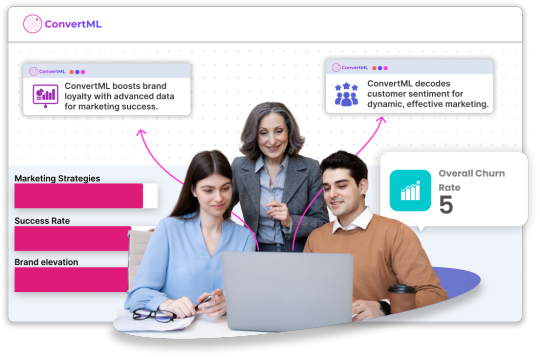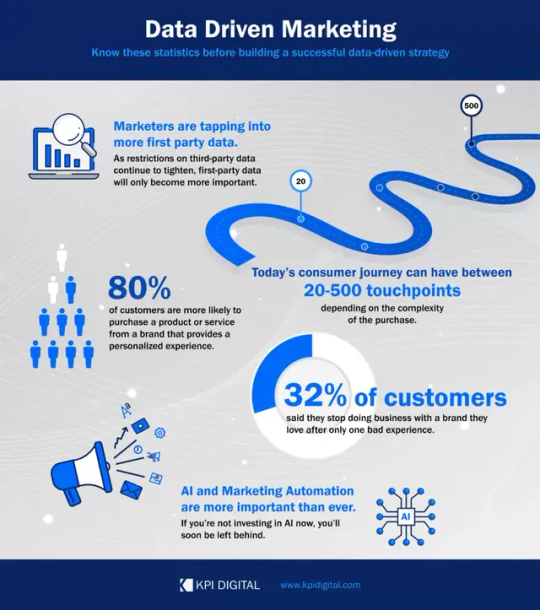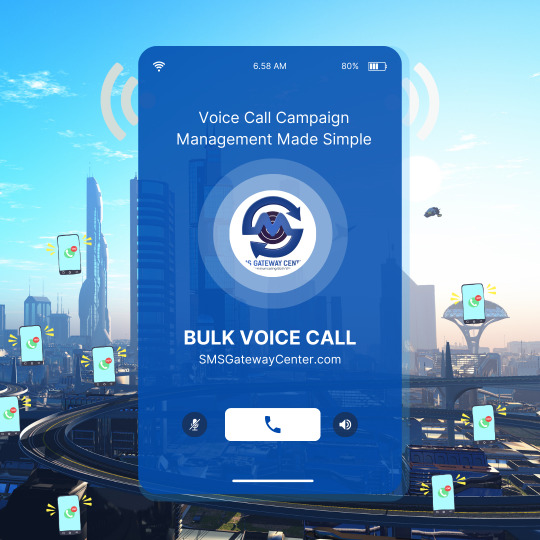#data-driven marketing
Text
Transforming Customer Insights into Actionable Marketing Strategies
In today's digital age, the goldmine of customer insights we sit on is staggering. But here's the kicker: having data is one thing; using it to turbocharge your marketing strategy is another ball game entirely. And for those not yet converting these insights into action, let's just say you're missing a trick, big time.
Customer insights are like the secret sauce to your marketing strategy, offering a direct line to what your audience wants, needs, and expects from your brand. But it’s not just about collecting data; it’s about decoding it, understanding the story it tells, and then crafting marketing strategies that hit right at the heart of your target audience. It's this bespoke approach, tailored to the unique preferences and behaviours of your audience, that can elevate your brand from background noise to centre stage in the highly competitive UK market.
Now, I hear you ask, "How do we make this leap from insights to action?" First off, it’s about getting under the skin of your data. Use advanced analytics to segment your audience, predict behaviours, and identify trends. Then, it’s about agility; taking those insights and rapidly turning them into personalised marketing campaigns that speak directly to the consumer. In essence, it’s about being as dynamic and fluid as the market itself, always ready to pivot based on fresh insights.

But beware, complacency is the enemy. The digital landscape is evolving at breakneck speed, and today's groundbreaking insight could be tomorrow's old news. This is where the urgency kicks in; staying ahead of the curve is not just advisable, it's essential. If you're not continuously iterating and optimising your strategies based on the latest customer insights, you're not just standing still, you're moving backwards, while more data-savvy competitors sprint ahead.
So, here’s the bottom line: transforming customer insights into actionable marketing strategies isn't just an advantage; it's a necessity in the modern digital age. Fail to do so, and you risk being left in the digital dust by competitors who understand the value of listening to, and acting on, what their data is telling them. The future belongs to those who can not only gather insights but who can turn these insights into action swiftly and smartly. Don't let FOMO be your wake-up call. Get ahead, stay ahead, and let your customer insights guide you to marketing glory.
#customer insights#actionable strategies#data-driven marketing#personalised campaigns#audience segmentation#marketing agility
0 notes
Text

Data-Driven Marketing Strategies with Predictive Customer Insights
Drive marketing excellence with ConvertML. Elevate customer advocacy through multi-channel NPS insights, personalized marketing campaigns, and holistic churn analysis. Revolutionize your marketing strategies now
0 notes
Text
Optimizing Ad Campaigns with AI: A Marketer's Guide
By leveraging AI technologies, marketers can optimize ad campaigns with AI precisely and efficiently like never before. In this blog, we'll explore how AI is reshaping ad campaigns, as well as examples and platforms where AI is making significant strides.
#AI in marketing#Ad campaign optimization#Artificial intelligence#Marketing strategies#Digital advertising#Machine learning#Marketing technology#Data-driven marketing#Ad targeting#Marketing analytics
0 notes
Text
5 KPIs Powering AI Startups

In the fast-paced world of artificial intelligence (AI), startups constantly seek innovative ways to carve out their niche, differentiate their products, and capture the attention of a discerning customer base. Within this highly competitive landscape, the ability to launch and effectively measure the impact of marketing campaigns is no longer a luxury—it's a necessity. This is where the critical role of metrics, including key performance indicators (KPIs), comes into play, serving as the compass that guides AI startups through the complex and often tumultuous waters of market penetration and customer acquisition.
Importance of Metrics in Marketing
Measuring marketing performance is essential for AI startups, which often face challenges like limited budgets and the need to explain complex technologies. Metrics provide tangible insights beyond surface-level data, enabling startups to gauge the health and potential of their growth trajectory. By analyzing the right metrics, startups can optimize their strategies, allocate resources efficiently, and pivot quickly in response to market feedback.
Understanding Marketing Metrics
In marketing analytics, there's a distinction between vanity metrics and actionable metrics. Vanity metrics, such as social media followers or page views, may look impressive but often lack meaningful insights. On the other hand, actionable metrics, like conversion rates and customer acquisition costs (CAC), are directly tied to business objectives and provide valuable insights into customer behavior and marketing effectiveness.
Setting Clear Objectives
Establishing clear, measurable objectives is foundational to any successful marketing strategy. For AI startups, objectives should be specific, measurable, achievable, relevant, and time-bound (SMART). By setting precise goals aligned with the startup's overarching business objectives, startups can tailor their marketing strategies effectively and track progress accurately.
Key Performance Indicators (KPIs) for AI Startups
In the high-stakes world of AI startups, where innovation meets market realities, understanding and leveraging key performance indicators (KPIs) is essential. These metrics not only lead the path to growth but also ensure that every step taken is informed, intentional, and aligned with the startup's overarching objectives. Below, we will discuss critical KPIs for AI startups, exploring their definitions, calculations, and strategic importance, alongside insights on leveraging analytics tools for continuous improvement.
Customer Acquisition Cost (CAC): CAC represents the average cost of acquiring a new customer and is crucial for assessing the efficiency and sustainability of growth strategies. While industry benchmarks can provide insights, startups should focus on optimizing their CAC to ensure cost-effective customer acquisition.
Customer Lifetime Value (CLTV): CLTV forecasts the total value derived from a customer throughout their relationship with the business. Understanding CLTV helps startups determine how much to invest in acquiring customers and identify valuable customer segments for targeted marketing efforts.
Conversion Rates: Conversion rates measure the percentage of potential customers who take desired actions, such as purchasing or signing up for a trial. Tracking conversion rates at each stage of the marketing funnel helps identify bottlenecks and optimize the customer journey for improved conversion.
Engagement Metrics: Metrics like time on site, pages per session, and repeat usage are vital indicators of product value and customer satisfaction. High engagement levels often correlate with higher retention rates and customer lifetime value, making them essential for assessing product-market fit and user experience.
Return on Investment (ROI): ROI measures the efficiency and effectiveness of marketing expenditures by comparing sales growth to marketing investment. Understanding ROI enables startups to make informed decisions about budget allocation and optimize marketing strategies for maximum impact.
Case Studies: Success Stories
Examining the success stories of AI startups provides valuable insights into the practical application of metrics-driven marketing strategies. For example, AlphaAI reduced CAC by implementing targeted content marketing, while BetaAnalytics increased CLTV through personalized user experiences. GammaVision doubled marketing ROI through rigorous experimentation and A/B testing.
Conclusion: In conclusion, a metrics-driven approach is essential for AI startups to navigate the complexities of the marketing landscape successfully. By focusing on key performance indicators like CAC, CLTV, conversion rates, engagement metrics, and ROI, startups can optimize their marketing strategies, allocate resources effectively, and achieve sustainable growth. Continuous measurement, analysis, and optimization are critical for success in the dynamic and competitive AI market.
#AI Startups#Key Performance Indicators#Data-driven marketing#Customer acquisition cost#Customer lifetime value#Conversion rates#Engagement metrics#Marketing ROI#Analytics tools#Data-driven culture
0 notes
Text

Data-driven marketing is a marketing strategy that uses data — acquired through consumer interactions and third parties — to gain a better view into consumers’ motivations, preferences, and behaviors. Marketers then use these insights to create personalized messaging and experiences that deliver the highest possible ROI.
#Data-Driven Marketing#data analytics company#Artificial Intelligence company canada#analytics and business intelligence solutions
0 notes
Text
Explore why Performance Marketing is crucial in today's UK digital landscape. Learn about its data-driven, cost-effective approach, precise customer targeting, agility, and integration with other marketing strategies for measurable success. Perfect for businesses adapting to digital trends.
#performance marketing#digital marketing#UK advertising#data-driven marketing#cost-effective advertising#customer targeting#marketing agility#marketing strategy integration#digital market trends#measurable marketing results#advertising ROI#performance-based advertising#Koobr
0 notes
Text

In today’s digital age, providing a personalized experience to customers has become more important than ever. It’s no longer enough to offer a one-size-fits-all approach.
#amazon marketing#e commerce service#Personalization Strategies#Data-Driven Marketing#Data analytics services
0 notes
Text
Integration of AI and Machine Learning in Email Marketing: Revolutionizing Strategies in 2024
Integration of AI and Machine Learning in Email Marketing: Revolutionizing Strategies in 2024
As we navigate through the year 2024, the landscape of email marketing is witnessing a revolutionary change, primarily driven by the integration of Artificial Intelligence (AI) and Machine Learning (ML). This integration is not just a fleeting trend but a fundamental shift in how email marketing…

View On WordPress
#AI in Marketing#Behavioral Segmentation#Consumer Data Analysis#Customer Engagement#Customer Relationship Management (CRM)#Data-Driven Marketing#Digital Marketing Trends#Email Campaign Strategies#email marketing#Future of Email Marketing#Hyper-Targeted Content#Machine Learning in Marketing#Marketing Automation#Marketing Technology#Personalization
0 notes
Text
The Ultimate Customer Value Optimization Guide
Unlock the secrets to maximizing customer value with our comprehensive guide. Learn proven strategies to enhance customer satisfaction, boost retention, and drive business growth. Discover the key to long-term success in the competitive market.
#Customer Value Optimization#Customer Satisfaction Strategies#Retention Techniques#Business Growth Tips#Customer Loyalty#Value Maximization#Customer-Centric Approach#Marketing Strategies#Customer Relationship Management#Revenue Growth#Customer Segmentation#Data Analysis#Lifetime Customer Value#Cross-Selling#Upselling#Customer Experience#Customer Engagement#Churn Reduction#Personalization#Data-Driven Marketing
1 note
·
View note
Text
Marketing Blindfolded? Ditch Gut Feelings with This Metric Masterclass
youtube
#marketing measurement#marketing metrics#marketing ROI#data-driven marketing#marketing analytics#marketing insights#marketing strategy#business growth#marketing tips#digital marketing#B2B marketing#small business marketing#content marketing#social media marketing#SEO#email marketing#e-commerce marketing#how to measure marketing success#improve marketing ROI#Youtube
0 notes
Text
What are the advantages of data science for marketers?
The advantages of incorporating data science into marketing strategies are numerous and can greatly benefit marketers in achieving their goals.
Let me break it down for you.
Advantages of Data Science for Marketers:
1. Improved Decision-Making:
Data science provides marketers with valuable insights and analytics that enable them to make informed decisions.
By analyzing data, they can gain a deep understanding of consumer behavior, preferences, and trends.
This knowledge allows them to tailor marketing strategies to target the right audience at the right time with the right message.
“Experimentation is the gold standard for data-driven decision-making once you have enough samples to do so” – Marketing Examined Newsletter
2. Enhanced Customer Segmentation:
With data science, marketers can segment their target audience into distinct groups based on various parameters such as demographics, interests, and buying behavior.
This segmentation helps them create personalized and targeted campaigns that resonate with each specific group.
By delivering relevant content to the right audience, they can maximize engagement and conversions.
3. Predictive Analytics:
Data science allows marketers to predict future trends and outcomes based on historical data.
By analyzing patterns and correlations, they can anticipate customer needs, identify potential market opportunities, and optimize marketing efforts accordingly.
This predictive capability empowers marketers to stay ahead of the competition and make strategic decisions that yield better results than ever.
“Data-driven marketing empowers marketers to react to changing customer needs more quickly and strategically. This is precisely why 90% of marketing leaders cite “martech, data, and analytics, CX and loyalty as top priorities”” – MarTech
4. Optimization of Marketing Campaigns:
Data science enables marketers to optimize their campaigns in real time.
By continuously monitoring key performance indicators (KPIs) such as traffic, engagement rates, click-through rates, conversion rates, bounce rates, or any other, they can identify areas for improvement and make necessary adjustments on the fly.
This agility ensures that their marketing efforts are always optimized for maximum effectiveness. In fact, this is the need of the hour.
5. Improved ROI:
Ultimately, the goal of any marketing campaign is to generate a positive return on investment (ROI).
Data science helps marketers achieve this by providing insights into the effectiveness of different marketing channels, messages, and strategies.
By identifying what works and what doesn't, they can allocate resources more efficiently, including guiding relevant teams and focusing on activities that deliver the highest possible ROI.
“When you use AI for marketing, you can make data-driven decisions about where you invest and allocate media spend” – MarketingProfs

In conclusion, data science offers numerous advantages to marketers.
By leveraging the power of data analytics, marketers can make better decisions, segment their audience effectively, predict trends, optimize campaigns in real time, and ultimately achieve a higher ROI.
Incorporating data science into your marketing strategy is no longer an option but a necessity in today's data-driven world.
Here's related information that you may also find helpful – Marketing ROI Statistics [Unlock the trends, insights, and strategies].
0 notes
Text

Whether you're a seasoned marketer or just getting started, you understand the importance of seamlessly and efficiently connecting with your audience. This is when SMSGatewayCenter steps in with a complete voice campaign management system that streamlines every step, from planning broadcasts to evaluating performance.
Voice Call Campaign Management Made Simple with SMSGatewayCenter
#SMSGatewayCenter#Bulk Voice Call#Voice Campaigns#Effortless Marketing#Marketing Efficiency#Data-Driven Marketing#sms gateway#bulk sms#sms gateway center#smsgateway#sms marketing#bulksms#bulk sms marketing
1 note
·
View note
Text
The Power of Marketing: Driving Success in the Digital Age
The average marketing spend as a percentage of company revenue has increased from 6.4% to 9.5% across almost all industries.The power of marketing drives success in the digital age In an ever-evolving business landscape, marketing has emerged as a driving force for success in the digital age. In this era of constant connectivity and technological advancement, effective marketing has become more important than ever. Unlocking unprecedented access is the key to reaching a global audience with the click of a button. Digital marketing has changed the way companies interact with consumers. Through social media, search engine optimization and email campaigns, companies can now engage directly with their target audience, gaining valuable insights into their preferences and behavior This data-driven approach enables businesses to change their strategies, and create personalized experiences that match customers. Additionally, digital marketing allows businesses of all sizes to play equally. Startups and small businesses can now compete with larger businesses through cost-effective online advertising and innovation. Content marketing, influencer collaborations, and viral campaigns can go global in a matter of hours, creating a ripple effect on brand awareness and consumer loyalty The Internet has transformed consumer decision making , where potential buyers research products and read online reviews before buying. These changes make it important for companies to establish a strong online presence and maintain a good reputation. Additionally, business-to-business tools simplify manufacturing processes, allowing companies to focus on strategic planning and raw material development. Personalization, customer segmentation and automated customer service have been key differentiators to gain competitiveness
In conclusion, the power of marketing in the digital age cannot be underestimated. It has changed how businesses interact with customers, driving unprecedented consumption levels. Adopting digital marketing strategies allows businesses to adapt to the changing times, build brand loyalty, and achieve incredible success in the hyper-connected world we live in today.
#Marketing Strategy#Digital Marketing#Success in Marketing#Digital Age#Online Advertising#Brand Awareness#Social Media Marketing#Customer Engagement#Content Marketing#Data-Driven Marketing#Customer Acquisition#E-commerce#SEO (Search Engine Optimization)#Customer Retention#Email Marketing#Mobile Marketing
0 notes
Text
Welcome to the era of data-driven marketing! As technology continues to advance at an exponential rate, marketers are finding themselves armed with a wealth of valuable information that can guide their campaigns and drive unprecedented results. Gone are the days of blindly taking shots in the dark, hoping to hit the bullseye. Today, successful marketers understand the power and potential of data-driven campaigns – strategies backed by actionable insights and real-time analytics. In this blog post, we’ll delve into why embracing data is no longer optional for any marketer who wishes to thrive in this ever-evolving digital landscape. So buckle up and get ready to uncover how harnessing the power of data can revolutionize your marketing efforts like never before! Visit us: https://www.gmatechnology.com/
1 note
·
View note
Text
Why is a Data-driven marketing strategy essential for Businesses?
Data-Driven Marketing is a practice that leverages data and analytics to make marketing decisions. Moreover, a data-driven marketing strategy is essential for modern organizations to stay competitive and achieve their marketing goals.
Here are some benefits of using data-driven marketing:
1. Helps increase ROI
2. Gain Customer insights
3. Aid in Personalizing Marketing Strategy
4. Promotes Better decision making
So, data-driven marketing has become somewhat of a necessity for businesses nowadays. To learn more about the uses and implementation, you can find more at Data-driven marketing for modern businesses.
0 notes
Text
Find out why digital marketing is considered the best investment in 2023 and how it can help businesses achieve their goals by reaching a wider audience, driving conversions, and staying ahead of the competition.
#digital marketing#data-driven marketing#search engine optimization#tumblr blog#tumblr search#tumblr things#tumblr settings#viral photo#viral today now#viral news#viral images#tumblrpost#viral trends
0 notes